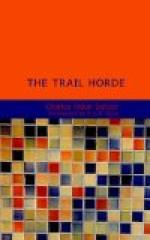The depression into which Blackburn and his men had crept was not more than three or four feet deep, with long, sloping sides which were covered with alkali and rotted rock. Along the edges grew greasewood and mesquite bushes, which afforded concealment but not protection. The shallow was wide enough for the horses, though the men were forced to throw the animals and stake their heads down, so that they would not show themselves above the edge of the depression and thus become targets for the outlaws.
The firing during the night was intermittent. Once the outlaws made an attempt to withdraw, rushing concertedly toward their horses, which they had concealed in a sand draw slightly behind them, southward. But Blackburn and his men were alert.
The outlaws had chosen a gully for their ambuscade, but they had made the mistake of leaving their horses too far away from their place of concealment. And when they rushed across the stretch of level that extended from the gully to the draw, half a dozen of them dropped before they had traveled a quarter of the distance. The others plunged back into the gully, while the Circle L men yelled exultantly.
As Blackburn had told Shorty, he did not expect to rout or capture the outlaws; the best he could hope for was that Shorty would get help in time to head off the cattle before the other outlaws drove them into Kinney’s canon or that he would bring help to the Circle L men in time to prevent the sanguinary fight which would certainly occur as soon as the day dawned.
And so Blackburn waited, grimly watchful; though worry began to wrinkle his face as he noted that the semi-gloom of the starlit night was lifting, and that a gray streak on the eastern horizon was slowly broadening.
CHAPTER XXIX
ANTRIM STRIKES
From the doorway of the cabin on the Rabbit Ear, Antrim had watched Slade and his men ride away. His gaze followed them until they vanished over the edge of the big plain above the river valley. Then, smiling crookedly, he turned back into the cabin.
Two men—one of them the tall man who had ridden away to return with the news that Lawler and the sheriff were riding northward—were draped on chairs watching the outlaw chief. They were expectant, eager; there was covert satisfaction in their eyes.
Like Selden, the other man wore two guns. There was about both men an atmosphere that suggested stealth and violence. It lurked over them, hinting of something sinister and deadly.
Selden wore a mustache that drooped at the corners of his mouth. It was the color of old straw—a faded, washed-out blonde, darkened here and there from tobacco stains. His mouth was large, the lower lip sagging in the center, giving it a satiric appearance, increased by the bleared, narrowed eyes that always seemed to be glowing with a questioning, leering light.




